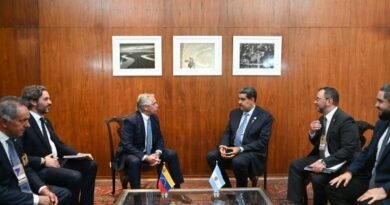Argentina to keep collecting Paraná Waterway toll, FM says
[ad_1]
Argentina to keep collecting Paraná Waterway toll, FM says
A toll is not going to define the relationship between Argentina and Paraguay, Cafiero argued
Argentina will continue to collect tolls from barges sailing through the Paraná-Paraguay River Waterway because it is something that was contemplated, Foreign Minister Santiago Cafiero said this weekend after his Paraguayan colleague Rubén Ramírez’s announcement last week otherwise. A toll is not going to define the relationship between both countries,.
Paraguayan President Santiago Peña said in a TV interview after an encounter with Argentina’s Economy Minister and presidential candidate Sergio Massa that we had the understanding in the meeting that the toll would be stopped, that we were going to have a space to talk, that there was going to be a meeting of all the presidents or foreign ministers, for this to be the great integration project of the five countries.
We left the meeting thinking that we had an understanding. We have a long history of love and disaffection with Argentina. This may be one more chapter of disaffection or a step towards the integration that Paraguay and Argentina need to work together, Peña also argued.
The reality is that international treaties have to be complied with. We are not unaware that Argentina has made an investment in that stretch of the Waterway. It can collect, but it can only be done once all the countries agree, Paraguay’s newly-inaugurated president insisted.
For Buenos Aires, these statements were a misunderstanding.
Regarding Argentina joining the BRICS, Cafiero pointed out that ”the challenges ahead of us are very important [because] the BRICS have more important economic support than the G7 (the group of the seven industrialized nations).″ BRICS represents a global GDP of more than 32%, when the G7 represents 30%, where the United States, Japan, Germany, [and] France are present, he stressed.
Being a member of BRICS is a great opportunity to promote investments and increase exports, Cafiero also said. It is important for our country to continue on this path, he added. It is a great opportunity because Argentina has trade with BRICS countries, the minister also noted.
Our first trading partner is Brazil and the second is China, and until last year the fourth trading partner was India, which means that there is already a commercial link with these countries, Argentina’s chief diplomat elaborated. According to Cafiero, there is no classic global financial architecture in BRICS but only specific instruments.
Cafiero also described the rejection of BRICS by presidential opposition candidates Javier Milei and Patricia Bullrich as electioneering, not even ideological because, for example, the gender policy that Argentina has, of diversity, is not shared by other BRICS countries. (Read also: Main opposition candidates against Argentina joining BRICS )
Multilateralism, of how countries have to reach dialogue and have spaces for exchange where things are said, is a construction that comes from the Second World War. The world decided that the mechanisms of international security, peace, the United Nations Security Council, and the different mechanisms of understanding should take place in areas where countries with their diversities can sit down, Cafiero insisted.
BRICS (Brazil, Russia, India, China, and South Africa) leaders agreed on Aug. 24 during the bloc’s 15th summit in Johannesburg to have six new countries (Argentina, Egypt, Ethiopia, Iran, Saudi Arabia, and the United Arab Emirates) joining the group, effective Jan. 1, 2024.
[ad_2]
Source link




